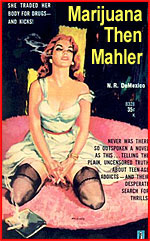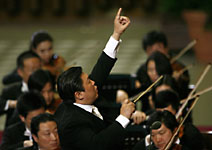or, as my friend B-dubbs Slocombé puts it: “it’s 3AM at Leonard Bernstein’s apartment on the Upper East Side. do you know where your child is?”
This is one of the funniest things I’ve seen in a while.
Musician
or, as my friend B-dubbs Slocombé puts it: “it’s 3AM at Leonard Bernstein’s apartment on the Upper East Side. do you know where your child is?”
This is one of the funniest things I’ve seen in a while.
A New Plymouth woman who played classical music to her cannabis plants to encourage them to grow was yesterday sentenced to community work.
Solo mother-of-three Zarah Murphy cultivated 20 cannabis plants in a room with photos of healthy plants as role models on the walls and played them “nice classical music”, her lawyer Pamela Jensen told New Plymouth District Court yesterday.
Ms Jensen said Murphy was growing the plants for her own use, to treat her diagnosed post-traumatic stress disorder, the Taranaki Daily News reported.
She was undergoing psychotherapy for her condition and could possibly attend drug counselling in future, Ms Jensen said.
Judge Allan Roberts said the converted room was a “pretty good effort” in which to grow the plants.*
He sentenced Murphy to 250 hours’ community work, including the remission of $1235 in unpaid fines.
– NZPA
*[Ed: umm…?]

or the other way around….
…the obscurity and pretension of Academic English can be attributed in part to a disruption in the delicate rhetorical balance between language as a vector of meaning and language as a vector of the writer’s own résumé. In other words, it is when a scholar’s vanity/insecurity leads him to write primarily to communicate and reinforce his own status as an Intellectual that his English is deformed by pleonasm and pretentious diction (whose function is to signal the writer’s erudition) and by opaque abstraction (whose function is to keep anybody from pinning the writer down to a definite assertion that can maybe be refuted or shown to be silly). The latter characteristic, a level of obscurity that often makes it just about impossible to figure out what an AE sentence is really saying, so closely resembles political and corporate doublespeak (“revenue enhancement,” “downsizing,” “proactive resource-allocation restructuring”) that it’s tempting to think AE’s real purpose is concealment and its real motivation fear.
DFW, “Authority and American Usage” from Consider the Lobster
Hence: https://www.willcwhite.com/audio/augusta%20trim.mp3
[Addendum: I do realize that the quote, the music, and the overall angsty anti-Modernist zeitgeist of this post are very 1990’s, but whatever — it still rings true, and as much as the situation may have changed, one must be ever vigilant.]
New to the British stage, Alan Bennett’s “The Habit of Art”
tells of a (fictional) visit in 1972 in Oxford between the onetime artistic collaborators Auden, who would die the next year, and Britten that finds room within it for the competing attentions of a rent boy (Stephen Wight), whom Auden has hired for a frolicsome bit of fellatio, and of Humphrey Carpenter (Adrian Scarborough), both men’s real-life biographer, who is on hand to dispense important bits of narrative and raise questions about “the shortcomings of great men.â€
Meanwhile, the British remain privy to the greatest, boldest artistic festival in recent memory: the London Philharmonic’s “Between Two Worlds” festival, featuring the music of Alfred Schnittke. Not surprisingly, the mainstream media across the pond is just as dunderheaded as it is here:
It seems a trifle self-indulgent of Jurowski to follow up this fiasco so soon with another hugely costly and equally bizarre mish-mash of mysticism and doggerel – Alfred Schnittke’s opera-cantata The History of D Johann Faustus, unperformed since its Hamburg première in 1995.
Um, did you just call Al Schnittke “doggerel“? Burn. I’ll let my readers be the judge:
The Faustus score embraces everything from pseudo-Bachian chorales and declamatory recitative in the style of the Passions through the manic depressive symphonies of Mahler and Shostakovich to Weill’s cabaret songs and even, I felt, a touch of Lloyd Webber schmaltz.
Wow, is that what you felt, Rupert? Well you must be like really, really smart to hear all of those things. I’m just overwhelmed. Did you also write this review?
I am so exasperated to find that the Evansville, South Dakota Volunteer Fire Department Symphony Orchestra has mandatorily decided to perform the cacophoneuous gross concertoes of the communist Alfred Schnittke.
What is wrong with the pomp and fireplace of Elgar? Or a rousting rendition of John Williams scores? The Conductor of the Symphony promised us Scheherazade and Paganini’s Violin Concerto Number One.
I did not purchase my season tickets to the ESDVFDSO to be treated to a barrage  of communist music .
This Schnittke is hurting my ears. Help me.
But seriously, much of the press concerning this festival brings up a larger critical problem concerning Schnittke and his music: that he is inevitably compared to Shostakovitch. Folks, this has simply got to stop. Because let’s be honest — objectively, Schnittke is a way better composer. Like, orders of magnitude better. Yes, they both lived in Soviet Russia, and Shostakovitch was certainly an influence on AS, but Schnittke is working on a whole different level, and the musical and extra-musical issues associated with his music are a total different beast.


Well, all of a sudden, it seems that there is a new major international figure in the world of conducting: Long Yu, whose Shanghai Symphony recently went on tour to the U.S. He’s sort of a Chinese Valery Gergiev – non-stop schedule, responsible for all the top Chinese orchestras (China Phil, Shanghai Symphony, Guangzhou Symphony, Beijing Music Festival) and a powerful political figure to boot.
The question is, why haven’t we heard of this guy before? I guess it’s probably my own fault for not investigating the Chinese classical music scene more extensively, despite my true belief that China is the single major emerging market for classical music, and that anybody truly interested in classical music as an Industry really ought to pick up a Mandarin Dictionary.
One really amazing thing, journalistically speaking, about Mr. Yu is the headlines that have accompanied his American visit — you just don’t see these kinds of titles about American and European conductors: “Shanghai Players Arrive, Driven on by their Titan“, “Sounds of China, Unveiled like an Iris” and my personal favorite: “Shanghai Symphony Conductor Long Yu Talks Music and Whiskey“.
Anyway, here’s some of the scant videographic evidence I was able to find of Mr. Yu, conducting the Mozart Requiem for the Vatican… somehow it doesn’t look or sound very Mozarty to me, but I’ll let you be the judge of that:
[p.s. I’m a conductor – why has no member of the press ever asked me to “talk whiskey”? Also, there’s surprisingly little actual “whiskey talk” for an article that bills itself thus. It doesn’t even say what brand he drinks.]
[pps. I’m a Wild Turkey man myself, in case any journalists happen to be reading this.]